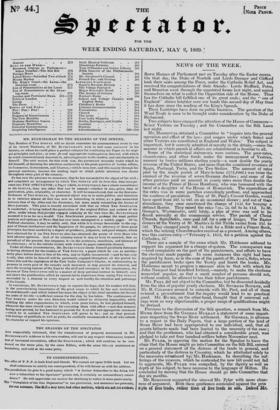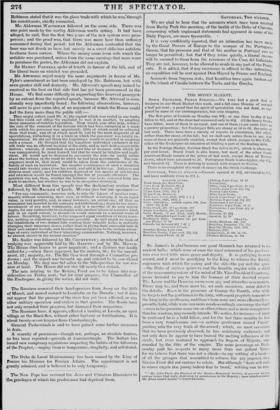NEWS OF THE WEEK.
BOTH Houses of Parliament met on Tuesday after the Easter recess. On that day, the Duke of Norfolk and Lords Dormer and Clifford took their seats among the Peers, under the Catholic Relief Act, and received the congratulations of their friends : Lords Stafford, Petre, and Stourton went through the appointed forms last night, and seated themselves on what is called the Opposition side of the House. Thus has the Catholic bill fulfilled one of its great ends ; and the " sun of England" shines brighter over our heads this second day of May than it has done since the reading of the King's Speech. Their Lordships have done no public business. The question of the Wool Trade is soon to be brought under consideration by the Duke of Richmond.
Two subjects have engaged the attention of the House of Commons— Select Vestries on Tuesday ; and the Committee on the Silk Laws last night.
Mr. HOBHOUSE obtained a Committee to " inquire into the general operation and effect of the laws and usages under which Select and other Vestries are constituted in England and Wales." The subject is important, but it scarcely admitted of novelty in the details,—since the manner in which paroch al affairs are administered is familiar to all.
Some of the statistical statements were curious. The poor-rates, church-rates, and other funds under the management of Vestries, amount to twelve millions sterling yearly—a sum double the yearly revenue of the United States, and more than the combined revenues of Spain, Portugal, Turin, and the Two Sicilies. The amount of rates paid by the single parish of Mary-le-bone (173,0001.) was twice the amount of the revenue of seven German duchies ; and some of the other parishes paid an amount in yearly rates more than double the income of the Prince of Hesse Homburg, who was honoured with the hand of a daughter of the House of Brunswick. The expenditure of the rates was in some parishes exceedingly profuse, and approached the confines of peculation. They of St. Paul's Covent Garden, would have spent from 201. to 601. on an occasional dinner; and out of their abundance, they once sanctioned the charge of 115/. for burying sa- defunct Rector. They raised the rates nbt,_.2.i. 6d. to 38. 11d. In St. George's, Westminster, until lately, a pipe of wine was said to 'be drunk annually at the communion service. The parish of Christ Church, Spitalfields, once paid 50/: for a pair of hinges. The Easter dinners of the Vestry of St. Martin's in the Fields _varied from 51/. to 70/. TheY charged yearly 33/. is. 10d. for a -Bible and a Prayer Book, which the retiring Churchtvarden received as a present, Among others, was this curious entry-." February 5, 1813, for a petition against the Catholics, 5l." • These are a sample of the cases which Mr. Hobhouse adduced to support his argument for a change of system. The consequence was —loud complaints on the part of the parishioners, and efforts to have the elections made popular. In some instances this right had been acquired by force, as in the case of the parish of St. Ann's, Soho, where the parishioners broke open the Vestry and burnt the books. Mr. Hobhouse meant to propose a measure akin to that with which Sir John Newport had benefited Ireland,—namely, to make the elections somewhat popular, so that a small number of persons should not, without control, be allowed to tax their fellow parishioners.
Mr. PEEL did not object to the Committee, but he dissented decidedly from the idea of popular yearly elections. Mr. STURGES BOURNE, and Mr. R. COLBORN seemed to coincide with Mr. Peel, and all of them evinced a presentiment that the inquiry would lead to no practical good. Mr. HUME, on the other hand, thought that if universal suf- rage were so very objectionable, a proper range of qualifications might be devised.
Previous to the discussion of the Silk question, a remark from Mi. HUME drew from Sir GEORGE MURRAY a statement of some import- ance respecting the Swan River settlement. Sir GEORGE, in allusion to a report in the Daily Papers, that a large portion of the land of Swan River had been appropriated to one individual, said, that all grants hitherto made had been limited to the necessity of the case ; and that the gentleman, who had obtained a considerable grant, was pledged to take out four hundred settlers before November next. Mr. FILER, in opposing the motion for the Speaker to leave the • chair that the House might go into Committee on the Silk Bill, entered on a general statement of the distress of the trade in general, and particularly of the distress in Coventry, which he attributed solely to the measures introduced by Mr. Huskisson. In describing the suf- ferings of the weavers, which he contended the new bill could not fail to aggravate, Mr. FILER was compelled, by the dignity as well as depth of his subject, to have recourse to the language of Milton. He concluded by moving that the House should go into Committee that day six months. Mr. ROBINSON supported the views of Mr. Fyler with more close- ness of argument. Both these gentlemen contended against the prim c:ple of fxee trade, rather than of free trade ill silk, Incleecl
Robinson stated that it was the glove trade with which he was; through his constituents, chiefly connected.
Mr. Alderman WAITEMAN followed on the same side. There was one point made by the worthy Alderman worth noting. It had been
alleged, he said, that the first two years of the new system were pros- perous; and the proof was, that there was more beer than ordinary consumed during that period : but the Alderman contended that the beer was not drunk as beer, but merely as a sweet oblivious antidote to charm down sorrow. Where the money came from with which the antidote was purchased, unless from the same earnings that were wont to purchase the porter, the Alderman did not explain.
Sir HENRY PARNELL spoke at length in favour of the bill, and of the liberal basis on which it was grounded.
Mr. Ammo urged nearly the same arguments in favour of Mr. Fyler's amendment as had been employed by Mr. Robinson, but with even greater skill and dexterity. Mr. Attwood's speech may indeed be received as the best on that side that has yet been pronounced in the House. We find some difficulty in supporting this deserved panegyric by an extract from the reported speech, because Mr. Attwood is occa- sionally very imperfectly heard : the following observations, however, will serve to give some idea of an argument of which the House could
feel the force more than the public will :-
They might collect (said Mr. A) the capital which was vested in one trade, but they could not oblige the capitalist to vest it in another, by adopting
those measures of reckless legislation. They would, year after year, witness the ruin of the remnant of the fortune which had been embarked in a trade with which the possessor was acquainted ; little of which could be collected from that trade, and all of which must be lost by the most desperate of all speculations, embarking it in a trade in which the possessor was totally in- experienced. He did not think the Legislature would be justified in adopting
such a course. He thought that the humblest individual embarked in the silk trade was an efficient member of the state, and as such held a respectable station; whereas, if embarked in any new line of business with which he was unacquainted, he must himself feel that he would be helpless and ineffi- cient. He would not be disposed to encounter the risk—he would rather share the fortune of the trade to which he had been accustomed. The con- sequence must he, that much would be taken from the subsistence of the family of such an individual. Six months' continuance of such a situation would take twenty years from his youth, and add it to his age. Sickness and distress must ensue, and his children deprived of the means of subsistence and education would be found amongst the list of juvenile offenders. The question was not, then, whether the labourer was to be removed from one trade to another, but whether he was to be altogether destroyed.
Most different from this speech was the declamatory oration that followed, by Mr. SADLER of Leeds. We can give but one specimen:— "For any community, however rich, to take the labour of another com- munity without returning their own, or without returning it to an equal value, (a very possible, and, in many instances, an actual case, all that an economist has asserted to the contrary notwithstanding,) tends to the impo- verishment of any such community, and is a sacrifice of its own labour. Again, for any community to exchange with another labour of a similar kind, and to an equal extent, is absurd—it would amount to a mutual waste of labour. Recurring, however, to the supposed equal condition of every coun- try, nothing so ridiculous could become possible. As well might we suppose the inhabitants of two distant hills wasting their valuable hours in mutually changing their necessary stores, rather than in plying their successful toils in their own natural bounds, and thereby increasing them to the certain advan- tage of every individual of their interesting communities. Nothing, however, so absurd, occurs in the animal creation."
Mr. Sadler was followed by Mr. COURTENAY ; on whom the task of replying was apparently laid by Mr. BARING ; and by Mr. MONCK. The House then began to grow impatient ; and a division was loudly called for ;—when there appeared, for the motion, 90 ; for the amend- ment, 22 ; majority, 68. The Bill then went through a Committee pro forma; and the report was brought up, and ordered to be considered on Monday. We may now bid adieu to the Silk-question for one ses- sion at least. The House did not rise till nearly two o'clock.
The acts relating to the Sinkine; Fund are to be taken into con- sideration on Friday next; but for \villa purpose, the Chancellor of the Exchequer, in giving the notice, did not state.



















